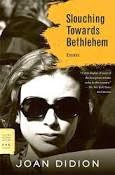by Elizabeth
My watch's battery has been dead for a couple of weeks. I have some pans and coasters I need to return to the store. My bathroom grout needs a dose of vinegar and baking soda, and my cat's nails could use a trim.
This is the stuff that plagues me today.
I have a beta-reading project I really need to get to. My WIP is demanding attention. I have to figure out what I'm going to feed my family for dinner tonight.
Stuff.
There's an unfortunate build-up of stuff on the counter in my breakfast room. The dog needs a walk. I have a pile of library books due in a couple of days.

Since I write contemporary women's fiction, it's tempting to use my life as fodder for my characters. I'll never forget hearing Amy Tan explain how she tried to justify her Chinese restaurant lunches as research for tax purposes (and getting shot down by her accountant husband). I wonder what Lou would say if I wanted to write off yoga teacher training? It's in my query letter.
I'm reading A Spool of Blue Thread right now, Anne Tyler's newest novel, and once again loving the little bits of life she peppers into her stories. She is truly the master of the tiny detail, seemingly insignificant tidbits of information that I never tire of reading. Here's an example:
It took a total of five vehicles to carry them all to the beach. They could have managed with fewer, but Red insisted, as usual, on driving his pickup. How else could they bring everything they needed, he always asked--the rafts and boogie boards, the sand toys for the children, the kites and paddle-ball racquets and the giant canvas shade canopy with its collapsible metal frame? (In the old days, before computers, he used to include the entire
Encyclopaedia Brittanica.) So he and Abby made the three-hour trip in the pickup, while Denny drove Abby's car with Susan in the passenger seat and the food hampers in the rear. Stem and Nora and the three little boys came in Nora's car, and Jeannie and Jeannie's Hugh started out separately from their own house with their two children, though not with Hugh's mother, who always spent the beach week visiting Hugh's sister in California.
In the book, that takes up about a third of a page, and really, there's nothing in there driving the action of the story, or anything particularly revealing about any of the characters (we already know Red well enough by page 133 to figure he'd be that kind of stubborn)--but it's a pleasure to read and its own kind of funny. (Tyler specializes in quirky characters.)
Hooray! That means I get to write about my character driving to the mall to the watch repair place and maybe gobbling down lunch at a Thai place and then dropping by the store for pita bread to have with dinner.
Except. Another book I read late last month included little details, too. Lots and lots and lots of them, and while this was the work of a celebrated novelist as well, I found myself wondering why it mattered where the old pajamas had been purchased, impatient with reading through a character picking up and putting down a phone repeatedly to show her ambivalence about making a call, nearly rolling my eyes when having to read about a character plugging the computer into an outlet to get a specific number of emails that have nothing to do with anything. This is a novel I enjoyed and finished, but one that probably had a good fifty pages worth of detail that could have been deleted. Had they been, I would have liked it much more.
My WIP was begun as a NaNoWriMo book five years ago, and when I picked it back up earlier this year and realized it was a project I wanted to finish and felt ready to work on again, it did indeed have the requisite 50 thousand words to its credit. To my credit, I rapidly acknowledged that probably 35 thousand of those would be biting the dust, most sooner rather than later. Repetition, fine details, and while there's the nugget of the story there, and some good detail even well written, much of it would make a reader's eyes roll even faster than it did mine.
Over and over as writers we hear the advice to make every word count. Every chapter, paragraph, sentence, word, must add to the story or be sacrificed. I've bristled at this idea at times, but reading my early partial draft, I'm ready to shout Hallelujah and sign on. With books like the one I read last month that will always have an asterisk in my mind, I've got the pen in my hand. But then I pick up Anne Tyler, and the pajamas she mentions are seersucker, and too light for the season, really, but the only option, and I know I could read paragraph after paragraph about them and know the time was well spent.









